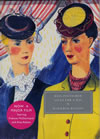Review: ‘Miss Pettigrew Lives for a Day’ by Winifred Watson
 Title: Miss Pettigrew Lives for a Day
Title: Miss Pettigrew Lives for a Day
Author: Winifred Watson
Published: Persephone Books, 2008, pp. 234
Genre: Early twentieth century fiction
Blurb: Miss Pettigrew is a down-on-her-luck, middle-aged governess sent by her employment agency to work for a nightclub singer rather than a household of unruly children. Over a period of 24 hours her life is changed — forever.
Where, when and why: I bought this book from a second hand book stall outside Winchester Cathedral earlier in the month. I saw first saw it in Waterstones sometime last year and have been wanting to read it ever since, so I was very pleased when I found this copy and started reading it as soon as I had finished my previous book.
What I thought: Happy books seem to be decidedly unfashionable. I cannot remember the last time I read a book that wasn’t written by Gerald Durrell which didn’t feature terrible, tear-jerking adversity to be overcome, moments of heartfelt misery, or at the very least self-indulgent angst. None of these are bad things per se, but it is nice to have a change sometimes if only to provide some much-needed contrast. Miss Pettigrew Lives for a Day is just such a breath of literary fresh air; it is a very happy book indeed. Reading it is like curling up in a comfortable chair with a pot of tea, a box of chocolates and a cat purring on your lap (which, incidentally, is exactly how I read this book). It is warm, comforting and just makes you smile.
The Cinderella story of Miss Pettigrew is absolutely delightful to read as Winifred Watson handles it so well. The tale of the eponymous heroine, a middle aged spinster who is treated to an experience of how the other half live when she is accidentally sent to apply for a job at the wrong address and is then adopted by beautiful nightclub singer Miss LaFosse, could easily have been sickly sweet and sentimental. Equally, the storyline lends itself to cruel humour at the expense of Miss Pettigrew or the wealthy people among whom she finds herself, but Watson deftly avoids becoming either saccharine or satirical. This book is entirely without malice, and yet it is full of social humour which reminded me at times of Jane Austen and Oscar Wilde, although Winifred Watson’s style is very different.
The characters in the book are enjoyable and likeable: the sort of characters who make you hope that everything will work out for them. Miss LaFosse is endearingly naive for all her worldly ways, and is full of warmth and understanding. Miss Dubarry is hardened and insightful but also vulnerable and emotional. The cast of accompanying men are equally amusing, and they are all believable though none are particularly complex characters. It is impossible not to warm to Miss Pettigrew herself as she is alternately shocked and delighted by the new, permissive world she discovers. It is highly entertaining to watch her adapt to her surroundings and the people around her adapt to Miss Pettigrew’s own particular character. Coming from her mouth, Winifred Watson puts more meaning in the single word “quite” than many authors do in whole paragraphs of dialogue.
Dialogue is a paticular strength of this novel. In fact, a lot of it is written entirely in direct speech. This works extremely well in the scene at the party where this dialogue is all without a designated speaker, as it is as though the reader can overhear other people’s conversations without knowing who exactly it speaking, just like being at a busy party. It gives the book the lively, sparkling feel of a Fred Astaire film and I loved every minute of it.
I can’t talk about this book without mentioning the gorgeous edition in which I read it. Number 21 in the Persephone Classics range, this book was as much of a pleasure to look at as it was to read. It featured the original drawings from the 1938 publication of the book, some of which were lovely and really helped to give a feel of the time and place of the novel, and others of which were not as successful. The pictures of Miss LaFosse in her negligee, for example, do make her look rather like a crocodile standing on its hind legs. Nonetheless, I was glad that they were included and I’ll definitely be buying more books from this publisher.
Where this book goes: This book is staying very firmly on my shelves. It’s a lovely story and the perfect antidote to a rainy day or a bad mood. Everyone should own this book for just such occasions.
Tea talk: While reading this book, I was drinking Regent’s Park tea from the wonderful Yumchaa in Soho. It’s a blend of green tea with pieces of papaya and pineapple, strawberries, raspberries and rose petals and may well be my new favourite tea. Its taste is light and sweet and the fragrance is divine. Go and try some.
